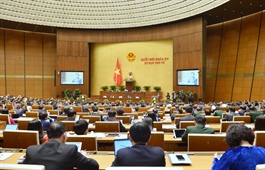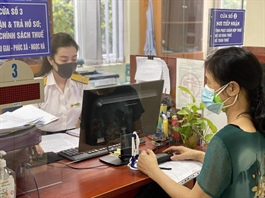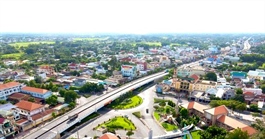Doors open for Vietnam-Singapore innovation ties
Doors open for Vietnam-Singapore innovation ties
Bilateral trade relations between Vietnam and Singapore in digital transformation, economy, and innovations are expected to further deepen. In September, both countries reaffirmed the relations and welcomed the strong and multi-faceted progress under the Singapore-Vietnam Strategic Partnership. At the sidelines of the Singapore Week of Innovation and Technology, Gan Kim Yong, Singapore’s Minister for Trade and Industry, talked to VIR’s Bich Thuy about new innovative business.
Vietnam and Singaporean leaders have agreed to boost ties in innovation and digital economy. How important is this in strengthening trade and digital transformation?
Vietnam and Singapore share an excellent bilateral relationship, with deep connections and complementarities between both economies.
Both countries are working together in opening new opportunities for enterprises in areas beyond the existing traditional industries.
One area that Singapore and Vietnam are both truly invested in is the green economy with a sustainability angle. We have recently entered into an agreement to collaborate on developing green energy and low carbon solutions, including an MoU on carbon credits. It is the first to be signed between Singapore and an ASEAN member state.
I believe there are many areas of cooperation to grow the economy of both countries. Trade agreements and deals like the carbon credits MoU are significant in laying the groundwork and providing the framework of cooperation so that companies understand how to compete and cooperate with one another.
Some of these projects also require deployment and support. In energy for example, while most projects are between private players, they often require government support because it involves renewables and, therefore, regulatory frameworks will come in. Another sector which is of importance is agritech along with food tech and innovation, with Vietnam being one of the major source of food supply for Singapore.
Supply chain resilience is also an area that we are very keen to foster collaboration.
Singapore has been attracting plenty of startups in new industries such as blockchain, Web3, and others. How can the city-state maintain this attractiveness, and what lessons can be offered to Vietnam?
Singapore has always been a hub for business or trading ideas, and we intend to keep up the momentum as other Southeast Asian countries such as Thailand, Vietnam, and Indonesia are also making themselves very attractive.
The competition for talent is global so we constantly review our policies to keep Singapore attractive. For example, we recently introduced the Overseas Networks & Expertise Pass. These passes are targeted at attracting top talents to Singapore – from tech entrepreneurs and business leaders to academia and leaders in arts, culture, and sports.
But it is not just an attractive income or the business environment that helps. It is also the ability to allow these talents to maximise their potential if they decide to come to Singapore.
What they require is the flexibility to be able to carry out exciting cutting-edge research and development, from piloting solutions to execution and scaling up.
In fintech for example, a few years ago we introduced the Fintech Regulatory Sandbox framework by Monetary Authority of Singapore that enables financial institution and fintech players to experiment with innovative financial products or services in a live environment but within a well-defined space and duration.
We’ve seen great progress with the evolution of some of the fintech and blockchain startups. It is important for the regulatory framework to evolve as the sector evolves because business cannot flourish if there is archaic legislation which limits creativity. A legal sandbox allows cutting-edge industries such as fintech, Web3, and agritech to experiment and test their concepts with certain safeguards.
Singapore has been supporting businesses and startups from other Southeast Asian countries. Are there any goals that you aim to achieve in terms of creating more networking with regional startups?
We are looking at a quite comprehensive and holistic approach to encouraging innovation and enterprises. For example, in the digital economy, within ASEAN there is a roadmap that was developed last year.
This year, we are now looking at taking it a step further and developing efficient product agreement frameworks that allow for a flexible framework, encouraging a lot of cross-country collaboration.
We’re also looking for best practices and solutions for a cross-border trading system, particularly for invoicing and e-commerce. These are all possibilities that the digital economy has opened up for the region. We need to look at it in a holistic way, and we need to push the digitalisation agenda and encourage more companies to digitalise and develop new and innovative solutions.
There is also the need to look at a more holistic view, which includes the government level and enterprise level – helping enterprises shift to digital and be able to innovate in a new economy. This calls for a multi-level collaboration between the government, enterprises, and at an individual level to adapt to a digital economy.
As a government, our role is to set the national agenda and facilitate the right frameworks and policies that support and bring different stakeholders together – to encourage solutions that help make the shift to a digital economy and also encourage fresh ideas.
Singapore is currently ranked seventh in the Startup Blink’s Global Startup Ecosystem Index Report, and we are also ranked seventh in the Global Innovation Index.
Many other countries in the region are also doing well in terms of startups and innovation. The key is whether we can come together and work together, and leverage one another's talents and strengths.
One such method is the Global Innovation Alliance. We have set up a network to connect innovative companies to overseas business and tech communities, find solutions, and address global innovation challenges.
We believe innovation should not be contained in just one country or one business, and we want to encourage the innovation of solutions that can benefit the entire region. We would like to move the innovative spirit beyond Singapore, to then be able to take advantage of and leverage innovation to mutually benefit our neighbouring countries.























